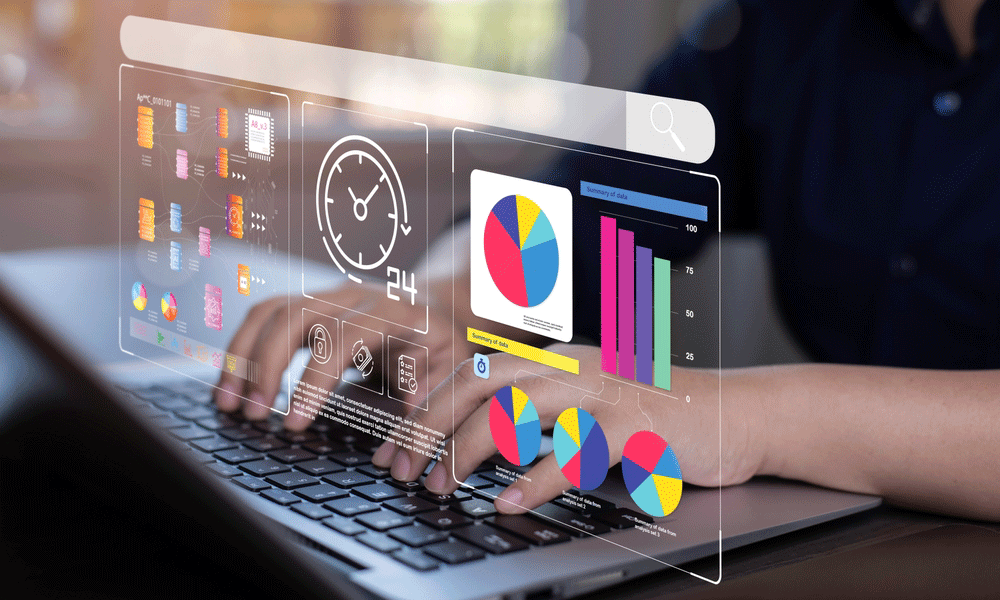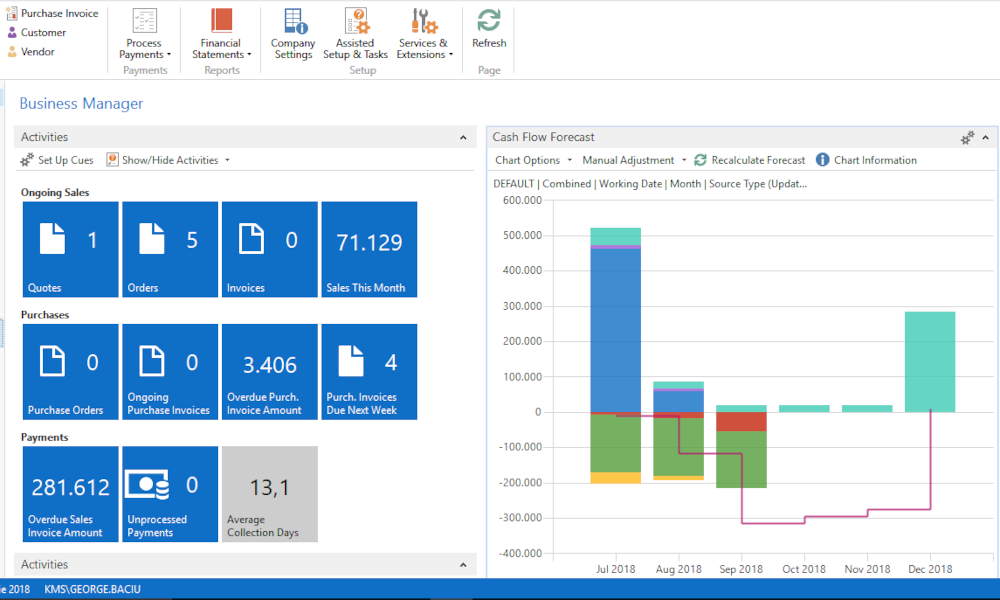Regardless of the nature of your business or the context in which you operate, gaining deep knowledge about the state of your organization is a crucial aspect. Through a comprehensive understanding of all aspects, you will have the ability to guide the enterprise towards success. Every decision you make becomes supported by real-time information, based on accurate data.
In the past, achieving such a comprehensive vision was a tremendous challenge, with data scattered across various departments and processes carried out manually. However, nowadays, by adopting an integrated ERP solution, you can significantly revolutionize the way your company operates. This modern approach allows for centralized data and process automation, leading to more efficient coordination and a deeper understanding of the entire organizational landscape.
An ERP system represents a sophisticated software suite that integrates a variety of processes, applications, and data into a centralized platform. It eliminates data silos and facilitates seamless collaboration. Operating as a true optimization engine, the ERP system streamlines workflows, providing a comprehensive view of business evolution and reducing risks by ensuring data transparency, traceability, and the application of advanced technology.
Such an ERP system provides the necessary tools to make well-informed decisions based on real-time data. It enables you to optimize business processes, enhance productivity, and respond swiftly to market dynamics. Essentially, an ERP system becomes a strategic partner, significantly contributing to the development of your business.
Keep reading to discover six ways in which using an ERP system provides you with an overview of your company’s operations.
Real-time analysis and data
Here are some practical examples of how you can leverage real-time analysis and data provided by an ERP system:
Sales information
You monitor sales performance, identify the most profitable products or regions, and evaluate the effectiveness of marketing campaigns.
Financial health
You track cash flow, monitor expenses, and analyze real-time profitability. This allows you to make data-driven financial decisions and identify opportunities for cost reduction.
Supply chain visibility
You’re keeping track of inventory levels, monitoring supplier performance, and ensuring timely deliveries.
Information about customers
By tracking interactions, feedback, and purchasing patterns, you gain a better understanding of customers’ behavior, preferences, trends. This enables you to tailor marketing strategies, enhance customer experiences, and foster long-term relationships.
Optimized business processes
The usual tasks that once demanded significant time and effort from the team are now effortlessly resolved thanks to an ERP system. From automated order processing and invoice generation to efficient inventory management and payroll administration, an ERP system optimizes the core business processes. It not only eliminates human errors but also ensures that operations run as planned. The result is clear: increased productivity, reduced operational costs, and a workforce focused on strategic initiatives contributing to business success.
Moreover, by instituting uniform workflows and best practices across the organizational spectrum, an ERP system promotes consistency and efficiency at every level.
Standardization brings significant benefits – reducing confusion, enhancing collaboration, and facilitating decision-making processes. When the entire team operates according to a unified guide, information flows efficiently between departments, fostering collaboration. As a result, overall efficiency increases, leading to accelerated development and higher customer satisfaction.
Furthermore, when all processes are optimized, automated, and standardized, you attain unprecedented clarity regarding your organization’s performance. An ERP system functions like a magnifying glass, providing an overview and facilitating the identification of obstacles, leveraging opportunities, and making informed decisions.
Here’s how you can optimize business processes through an ERP:
Efficient order management
Automate the order processing, monitor orders in real-time, and optimize inventory levels.
Simplified financial management
Automate invoicing and payments, improve cash flow management, generate instant financial reports, and minimize errors.
Improved human resources management
Automate recruitment processes, track attendance, evaluate employee performance, and reduce administrative tasks using employee portals.
Automated supply chain operations
Automate procurement processes, vendor management, and stock replenishment. Monitor supplier performance and identify cost-saving opportunities.
Effortless Customer Relationship Management (CRM)
Centralize customer data for access in one place, automate personalized marketing campaigns, and provide insights into customer interactions and feedback.
Centralized data management
By maintaining an uninterrupted flow of information, you encourage collaboration, empower the decision-making process, and stimulate innovation. With a centralized foundation for all business data, you unleash the potential to leverage data-driven insights and fully harness the organization’s resources.
In an era where cyber threats are constant, an ERP functions as a digital fortress equipped with robust security measures to safeguard your company’s information. Role-based access control ensures that only authorized personnel can access specific data, reducing the risk of information leaks. Regular data backups and encryption protocols fortify information against potential unfortunate incidents. This heightened security allows you to focus on what truly matters – making strategic decisions with the confidence that your company’s data is safe from prying eyes.
Additionally, an ERP system paves the way for easy access to data. Whether you’re at the office, working remotely, or attending a crucial meeting, accessing vital business information becomes incredibly straightforward.
Cloud-based ERP platforms facilitate real-time access from any device, ensuring that you stay connected and informed no matter where you are.
As all departments share data from a common source, you gain a comprehensive understanding of your organization’s performance. You can analyze cross-functional data, identify correlations, and make well-informed decisions that positively impact the entire business. From financial indicators to sales analysis and customer behavior, you have a comprehensive view of every aspect, enabling precise business management.
Moreover, a holistic view extends beyond your organization’s boundaries. ERP systems enable you to integrate external data into your analyses, such as market trends and significant industry events. This strategic foresight provides you with the agility to swiftly respond to dynamic market changes and surpass the competition.
Improving reporting and decision-making processes
Imagine having access to customized dashboards providing real-time visualization of key performance indicators (KPIs). From sales figures and revenue trends to inventory turnover and customer satisfaction levels, these reports present complex data in an easily digestible format. You’ll easily spot patterns, identify outliers, and draw significant conclusions to shape your business strategy.
Using reports generated by an ERP solution, you’ll be equipped to identify areas for improvement, recognize potential risks, and optimize processes. With this deep understanding of your business, you’ll make decisions aligned with the long-term vision of the company, steering the organization towards remarkable success.
Additionally, ERP systems facilitate collaboration within the leadership team. This enables sharing the same reports, discussing data-driven insights, and reaching collective decisions aligned with the organization’s objectives. Through this process, you foster a culture of accountability, transparency, and innovation, where decisions are data-backed and confidently implemented.
Improved collaboration and communication
With a centralized ERP platform, information flows seamlessly across departments. Sales data influences production planning, triggering updates in inventory, all of which are instantly reflected in financial records. Consequently, each department remains synchronized, dynamically responding to market demands and customer needs.
Additionally, ERP systems facilitate easy communication through integrated messaging and notification solutions. These tools aid teams in staying connected, exchanging critical information in real-time. This cohesion enables the organization to adapt swiftly, collectively address issues, and capitalize on opportunities.
Increased collaboration amplifies responsibility and empowers employees. When teams collaborate in an open environment, they share successes and collectively address challenges. This fosters a positive work climate where each individual is encouraged to contribute optimally, resulting in a more engaged and productive workforce.
Scalability and flexibility
As your business evolves and expands, you need a solution that grows with you—a scalable ERP system that can adapt to the ever-changing needs of your organization.
Whether you’re opening new locations, expanding your product range, or exploring new markets, an ERP system easily adapts. It can handle increased data volumes, a growing customer base, and increasingly complex business processes without sacrificing performance. Thanks to the scalability of an ERP system, you can explore new directions of growth confidently. You won’t need to invest in multiple software solutions as your business expands because a reliable ERP system remains with you throughout your entire journey.
As industry trends evolve and new technologies emerge, the ERP system evolves accordingly. With regular updates and improvements, it stays current with the latest innovations, incorporating them to meet the ever-changing needs of your business.
ERP systems are designed to be configurable, tailored to unique business processes and industry requirements. You can add new modules, customize workflows, and seamlessly integrate third-party applications while maintaining a unified platform.
Benefiting from a flexible ERP system extends beyond immediate advantages. Its scalability instills confidence that your organization can grow without outpacing the software’s capabilities. Its adaptability allows you to react swiftly and confidently address emerging opportunities.
Investing in a flexible ERP solution signifies a commitment to resilience, relevance, and continuous growth within your organization. It’s a strategic choice that empowers you to navigate the dynamic business landscape and emerge victorious, no matter the challenges that arise.
Exploring the multiple advantages of ERP systems in providing a comprehensive view of your business, it’s time to consider implementing such a system in your organization.






